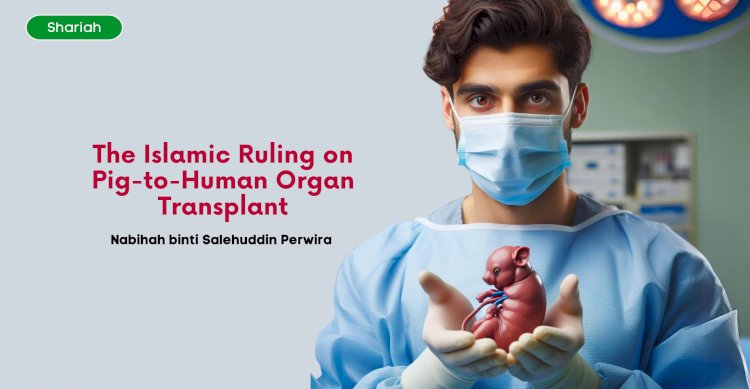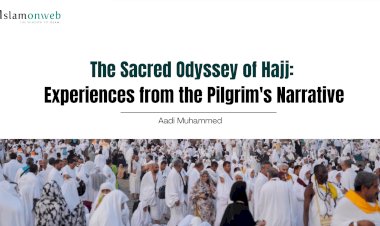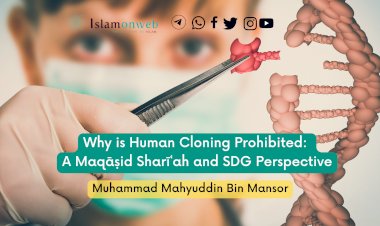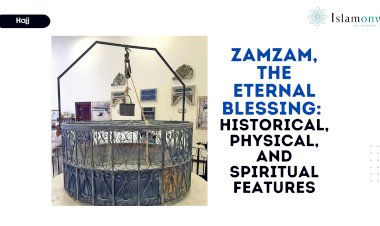The Islamic Ruling on Pig-to-Human Organ Transplant
Recently, there has been significant attention within the scientific and media communities toward the noteworthy achievement of a successful experiment wherein a pig kidney was transplanted into a human body. This experiment was conducted in July 2023 at New York University Langone. By August, Dr. Robert Montgomery, a professor and chair of the department of surgery at NYU Langone Health, reported that the transplanted pig kidney had been functioning correctly for a month. And studies have shown that pigs are generally considered to be an ideal potential source of organs transplantation for human. The consideration of pig organs for xenotransplantation is primarily due to their similarity to human organs in terms of both size and shape, ensuring a proper fit and functional integration within the recipient's body. Additionally, pig organs exhibit physiological functions that are comparable to their human counterparts, with examples such as the heart, kidneys, and liver in pigs performing functions akin to those observed in humans. This similarity can make it easier for pig organs to function effectively when transplanted into humans. However, the transplantation of pig organ into human body raises discussion among Muslim scholars due to the prohibition and impurity (najasah) of pigs in Islamic law.
As Allah states:
﴿حُرِّمَتْ عَلَيْكُمُ الْمَيْتَةُ وَالدَّمُ وَلَحْمُ الْخِنْزِيرِ ﴾
{Prohibited to you are dead animals, blood, the flesh of swine} ". Surah al-Maidah:4
This prohibitions are indeed extended to various aspects of life, including dietary choices and medical treatments.
The Ruling of the Usage of Pig in Medical Treatment
Muslim scholars have unanimously agreed (ijma') that pork, including both males and females, whether young or old, is prohibited. This prohibition extends to its flesh, fat, nerves, brain, bones, cartilage, and all internal organs. Additionally, there is a unanimous consensus among scholars on the impurity of the pig. This consensus underscores the prohibition of consuming pork and its classification as najasah (impure) in Islamic jurisprudence.
However, the Maliki Scholars s are the only ones who assert that pig's hair is considered pure if they are cut, not plucked. According to Imam Shihab al-Din al-Nafrawi (d. 1126 AH), "Every part removed from a pig, whether it be flesh, skin, or bone, is considered Haram (forbidden) for use in normal circumstances. Except for its hair, which the Sharia (Islamic law) has made permissible for use, as indicated by his statement: 'And the Sharia has allowed the use of its hair after purifying it."
Umm Salamah (RAA) narrated that the Messenger of Allah (ﷺ) said:
إِنَّ اللَّهَ لَمْ يَجْعَل شِفَاءَكُمْ فِيمَا حَرَّمَ عَلَيْكُمْ
"Allah did not make your cure in what He made Haram (unlawful) to you."
(Sahih Ibn Hibban, Sunan Baihaqi.)
The original ruling in Islam it is forbidden to seek treatment through impure substances najasah. However, Ibn Juzayy Al-Kalbi(d. 741AH) mentioned in Qawanin Al Fihiyyah that The use of wine and urine without drinking, such as washing a wound with them, and the use of other minor impure materials, for the purpose of treatment is permissible. This suggests that there is a position within Islamic jurisprudence that allows the use of such impure substances najasah for medicinal purposes, particularly when there are no permissible alternatives available and the individual is in need of treatment.
As example, if a person's bone is broken, it should be set with a pure bone. Ashab al-Shafii (the scholars who developed and transmitted the Shafi’i madhab from the time of the immediate students of Imam al-Shafi’i (c. 200 AH) to the time of al-Ghazali (c. 500 AH) ) says that it is not permissible to connect it with impure (najis) bone when there is an option to use a pure one. If the person needs the setting and cannot find a pure bone to use, they are considered excused. However, if they do not need it and can find a pure bone to use, it is a sin, and the impure bone must be removed unless there is a risk to the person's well-being. Treating a wound with impure medication and stitching it with impure thread, like connecting a bone with an impure one, requires removal. The removal is obligatory (wajib) as stated by scholars like Al-Mutawalli (d. 478 AH), Al-Baghawi (d. 510 AH), and others. And in the scenario where a wound is opened and there is a discharge of blood or other impurities, or if someone receives a tattoo on their hand or elsewhere, it become impure when stitched. This impurity is assigned the same ruling as the ruling of bone, and this view is widely recognized as most accurate and well-established. Imam Al Ruyani (d. 502H) mentioned in Bahr Al Mazhab: When a person's bone is broken and they need to mend it with a bone, it should be repaired with a permissible bone, which is a pure bone (from pure animals) suitable for consumption, like that of a permissible animal to eat. If a person's tooth is extracted and they replace it with the tooth of a permissible animal suitable for consumption, it is also permissible. However, if one intends to mend it with an impure bone, such as that of a dog, pig, or carrion, and they are not compelled to do so, then it is not permissible. If they are compelled to do so because they have no other option, it is permissible because it becomes a matter of necessity, similar to consuming carrion. If there is no compulsion, then it is not permissible to mend it with an impure bone.
Syeikh Ali Muhyiddin Ali al-Qaradaghi discussed the issue of the source of transplanted organs from animals in the context of Islamic jurisprudence. He stated that if the animal is pure, like cattle (such as cows or camels), then there is no problem in using its organs for transplantation into a human body. However, if the animal is impure, there is a difference of opinion among scholars. Some, like the Shafi'i, have permitted it in cases of necessity. Notably, the Hanafi has allowed the utilization of organs from all animals for medicinal purposes except for the pig. According to the Fatawa al-Hindiyya, it is stated that there is no issue with using the bones of animals like sheep, cattle, camels, or horses for treatment unless the bone is from a pig.
Moreover, in the context of Sharia, medicine is guided by the maqasid al-sharia, specifically emphasizing "hifz al-nafs" or the preservation of life is among Ḍarūriyyāt. “Ḍarūriyyāt refers to the necessary things for the protection of faith, life, intellect, family, and wealth”.
"In Islam, human life is perceived as a unique blessing from Allah, and therefore, it needs to be honoured and protected. “If anyone slays a human being, unless it be [in punishment] for murder or spreading corruption on earth, it shall be as though he had slain all mankind; whereas, if anyone saves a life, it shall be as though he had saved the lives of all mankind” (Quran, 5: 32). Though this verse is applied in general, it directly serves as a governing rule for those working in health care since they deal with human life in the first place. Besides, Islam considers seeking treatment as a recommended and meritorious duty on every sick person. Prophet Muhammad says, “Never Allah sent a disease without sending its cure” (al-Bukhārī, 1987 AH)".
The goals of medical treatment within this framework are aimed at achieving the following:
- Preservation of existing health.
- Restoration of lost health to the extent possible.
- Elimination or reduction of illness to the extent possible.
- Choosing the lesser of two harms to achieve the greater good.
- Prioritizing the greater benefit over the lesser benefit.
In the pursuit of the goals of medical treatment within the context of Sharia, scholars and jurists employ the fiqh principle الضرورات تبيح المحظورات which means “Necessities permit the prohibited”.
It emphasizes that when a prohibited or impermissible substance or action becomes a means to preserve the overall well-being and health of an individual, and there are no permissible alternatives available according to the knowledge of a qualified expert or healthcare provider, then the use of that prohibited substance can be considered permissible. This is based on the Quranic verse:
﴿إِنَّمَا حَرَّمَ عَلَيْكُمُ ٱلْمَيْتَةَ وَٱلدَّمَ وَلَحْمَ ٱلْخِنزِيرِ وَمَآ أُهِلَّ بِهِۦ لِغَيْرِ ٱللَّهِ ۖ فَمَنِ ٱضْطُرَّ غَيْرَ بَاغٍۢ وَلَا عَادٍۢ فَلَآ إِثْمَ عَلَيْهِ ۚ إِنَّ ٱللَّهَ غَفُورٌۭ رَّحِيمٌ﴾
Indeed, He has only forbidden to you dead animals, blood, the flesh of swine, and that which has been dedicated to other than Allah. But whoever is forced [by necessity], neither desiring [it] nor transgressing [its limit], there is no sin upon him. Indeed, Allah is Forgiving and Merciful." (Surah Al-Baqarah:173).
Conclusion
For medical treatment using substances that are typically considered impermissible in Islam, several conditions must be met:
- Knowledge of efficacy: There must be a reasonable basis to believe that the treatment will be effective and contribute to healing or improvement of the health condition.
- Absence of Halal alternatives: There should be no permissible (halal) alternatives available. In other words, the use of impermissible substances should be a last resort when there are no lawful alternatives.
- Supervision by knowledgeable practitioner: The treatment should be administered under the supervision and advice of a competent and trustworthy Muslim physician or healthcare provider. If the individual is not knowledgeable about medical matters, they should rely on the guidance of a qualified healthcare professional who understands both the medical and ethical aspects of the treatment. This guidelines accordance to an Islamic legal maxim :
مصالح الدنيا ومفاسدها تعرف بالتجارب والعادات
"Maslahah and harm which involves the worldly matters is known through tajarrub (experience, experiment) and custom."
These conditions are in place to ensure that the use of impermissible substances for medical purposes is carried out with care, necessity, and in accordance with Islamic principles. It is essential to consult with qualified scholars or healthcare professionals who are well-versed in Islamic jurisprudence and medical ethics when making such decisions.
Wallahualam.
[As part of Synergised Academic and Student Activities, this article was prepared for the course RKFQ 4141A, Qadaya Fiqhiyyah Mu’asirah: Contemporary Juristic Issues at AHAS KIRKHS, IIUM (Sem 1, 2023-2024]
References
https://www.ncbi.nlm.nih.gov/pmc/articles/PMC896146
Ibn al-Qattan al-Fasi, 'Ali ibn Muhammad (2003), Al-Iqna’ fi Masa’il al-Ijma .Dar al-Qalam.
Ibn Juzayy, Muhammad ibn Ahmad, al-Qawanin al-fiqhiyah (Dar al-Kutub al-'Ilmiyah, 1998)
Jaffāl ʻAlī Dāwūd Muḥammad(1990), Al-Masāʼil al-Ṭibbīyah al-Muʻāṣirah Wa-Mawqif al-Figh al-Islāmī Minhā .Dār al-Bashīr.
Maryam Ketos , Gene-edited pig kidney transplanted into brain-dead patient 1 month ago is still functioning, doctors say. ABC News, accessed on 21 Nov 2023 https://abcnews.go.com/Health/gene-edited-pig-kidney-transplanted-brain-dead-patient/story?id=102306767 .
Muhsin, S.M. Islamic Jurisprudence on Harm Versus Harm Scenarios in Medical Confidentiality. HEC Forum (2023). https://doi.org/10.1007/s10730-022-09503-w https://link.springer.com/content/pdf/10.1007/s10730-022-09503-w.pdf?pdf=button
Muhsin, S.M. Medical Confidentiality Ethics: The Genesis of an Islamic Juristic Perspective. J Relig Health 61, 3219–3232 (2022). https://doi.org/10.1007/s10943-021-01313-7 https://link.springer.com/article/10.1007/s10943-021-01313-7
Muhsin, Sayyed Mohamed and Amanullah, Muhammad Amanullah and Zakariyah, Luqman (2019) Framework for harm elimination in light of the Islamic legal maxims. Islamic Quarterly, 63 (2). pp. 233-272. ISSN 0021-1842
Nafrawi, Ahmad ibn Ghunaym(1955) ,Al Fawakih Ad Dawani Ala Rissalah Ibn Abi Zayd Al Qayrawani .Bayrut : Dar al-Ma'rifah.
Nawawi, Abu Zakariyya Yahya ibn Syaraf (2002), al-Majmu' sharh al-Muhadhdhab. Beirut:Dar al-Kutub al-'Ilmiyah.
Qarah Daghi, 'Ali Muhyi al-Din 'Ali(2008), Fiqh al-qadaya al-tibbiyah al-mua'sirah dirasah fiqhiyah tibbiyah muqaranah muzawwadat bi-qirarat al-majami' al-fiqhiyah wa-al-nadawat al-ilmiyyah .Dar al-Basha'ir al-Islamiyah.
Ruyani, Abd al-Wahid ibn Isma'il(2009), Bahr al-Mazhab fi Furu' al-Mazhab al-Syafi'i. Bayrut : Dar al-KutuIb al-'Ilmiyah
Wang, Wei, Wenbo He, Yongle Ruan, and Qing Geng. “First Pig-To-Human Heart Transplantation.”
About the author
Nabihah binti Salehuddin Perwira is pursuing her Bachelor's degree in Islamic Revealed Knowledge and Heritage (Fiqh and Usul al-Fiqh) at AHAS, KIRKHS, in the International Islamic University Malaysia.
Disclaimer
The views expressed in this article are the author’s own and do not necessarily mirror Islamonweb’s editorial stance.
























Leave A Comment